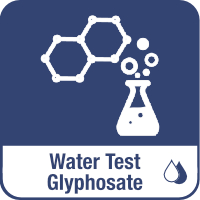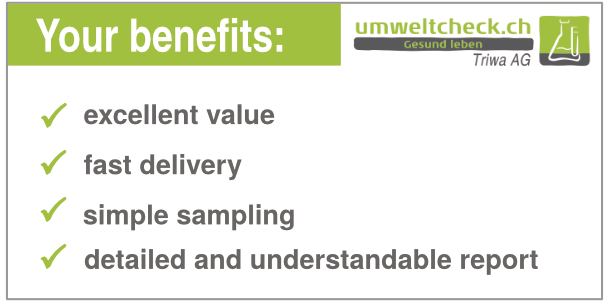Water analysis Glyphosate

CHF 202.00
Free shipping
Available, delivery time: 1-3 days
✔ Commonly used pesticide
✔ Possibly carcinogenic
Product information "Water analysis Glyphosate"

Glyphosate in Drinking Water? Test Now
Glyphosate is the main component of several total or broad-spectrum herbicides, widely used in agriculture for weed control. It is produced both as an acid and as a salt.
The effects on human health remain controversial: The International Agency for Research on Cancer (IARC/WHO) has classified glyphosate as “probably carcinogenic to humans”. There are also indications of neurotoxic and reproductive effects. As one of the most widely used weed control agents, glyphosate inevitably enters the environment during field application. As a result, glyphosate is repeatedly detected in surface waters and groundwater, and the risk of residues in drinking water cannot be completely excluded.
The limit value for glyphosate in drinking water is 0.1 µg/l (EU drinking water limit for pesticides). A proposed increase in the revised Water Protection Ordinance was not implemented after strong opposition.
This test shows whether residues of the herbicide glyphosate can be detected in your drinking water.
Reasons why a water test can be useful for you:
- You consume your tap water regularly.
- The water shows abnormalities in colour, smell or taste.
- Your household includes people with weakened immune systems or risk groups (babies, children, pregnant women or people with health issues).
- The water is used to prepare baby food.
- You use your tap water in a soda maker.
Glyphosate in Drinking Water? Get Certainty
Check your drinking water for residues of the herbicide glyphosate. Within 2–3 weeks you will receive a detailed laboratory report for your safety.
This might also interest you – combine cleverly and save.
✔ Most common pesticides
✔ Glyphosate separate analysis
✔ Risk of transmission during showering
✔ Causes Legionnaires' disease
✔ 20 common PFAS chemicals
✔ Per- and polyfluorinated alkyl substances



